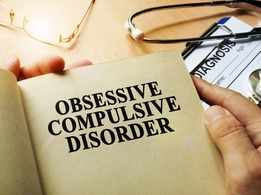Coronavirus: Heart rates can indicate COVID-19 in people; here's what we know
COVID can be transiently air-borne but masks can keep one safe: Study
Make Bengaluru your ‘Permanent Address:’ 6 Reasons why this is the best time to invest
What's 'Dry January' and why does it matter right now?
My COVID Story: My dad's hand was swollen due to all the injections and saline
Coronavirus: Heart rates can indicate COVID-19 in people; here's what we know
Coronavirus: Heart rates can indicate COVID-19 in people; here's what we know

Considering the growing number of COVID cases in and around the world and the lingering fear surrounding the new UK coronavirus strain, people have become more alert and cautious in recent times. Besides the symptoms and the medical complications that come along with the coronavirus, a new study has found that changing heart rates can also determine whether you have COVID-19 or not.
While the United Kingdom was the first country to roll out the COVID vaccine, it also became the hub for the mutant virus, which led to a state of turmoil and confusion. However, amidst all the chaos, the government and public health officials have asked its people to be more careful and cautious.
The role of resting heart rate in determining COVID-19
The COVID Symptom Study app, a not-for-profit initiative, studied data from over four million contributors globally, which eventually claimed that a person's heart rate can determine whether he or she has contracted the virus or not. According to researchers of the same study app, COVID-19 can cause an irregular or high heart rate - over 100 beats per minute.
Luca Foschini, Co-founder of US-based health and measurement company Evidation Health, states, "A huge spike in resting heart rate is a more sensitive indicator of Covid. And for people with activity trackers, you could ask them permission to share that information for screening purposes, just like taking a temperature reading."
In an analysis conducted by Fitbit data and self-reported symptoms, it was found that increased resting heart rate was an indicator of the disease in people.
How to measure your heart rate?
The COVID Symptom Study app has provided a set of guidelines to measure the heart rate in order to identify whether one has COVID or not. Following are the steps to take.
- Relax for five minutes before checking your heart rate.
- Check your pulse with your index and middle fingers. Press against the inner side of your wrist or on the outer side of your windpipe under your jaw.
- Count the number of pulse beats you feel for 60 seconds, or count the beats for 30 seconds and multiply it by two.
- A regular rhythm of pulse beats is normal.
If your resting heart rate is between 60 and 100 beats per minute (bpm), then you have a normal heart rate.
While the United Kingdom was the first country to roll out the COVID vaccine, it also became the hub for the mutant virus, which led to a state of turmoil and confusion. However, amidst all the chaos, the government and public health officials have asked its people to be more careful and cautious.
The role of resting heart rate in determining COVID-19
The COVID Symptom Study app, a not-for-profit initiative, studied data from over four million contributors globally, which eventually claimed that a person's heart rate can determine whether he or she has contracted the virus or not. According to researchers of the same study app, COVID-19 can cause an irregular or high heart rate - over 100 beats per minute.
Luca Foschini, Co-founder of US-based health and measurement company Evidation Health, states, "A huge spike in resting heart rate is a more sensitive indicator of Covid. And for people with activity trackers, you could ask them permission to share that information for screening purposes, just like taking a temperature reading."
In an analysis conducted by Fitbit data and self-reported symptoms, it was found that increased resting heart rate was an indicator of the disease in people.
How to measure your heart rate?
The COVID Symptom Study app has provided a set of guidelines to measure the heart rate in order to identify whether one has COVID or not. Following are the steps to take.
- Relax for five minutes before checking your heart rate.
- Check your pulse with your index and middle fingers. Press against the inner side of your wrist or on the outer side of your windpipe under your jaw.
- Count the number of pulse beats you feel for 60 seconds, or count the beats for 30 seconds and multiply it by two.
- A regular rhythm of pulse beats is normal.
If your resting heart rate is between 60 and 100 beats per minute (bpm), then you have a normal heart rate.
End of the article
Comments (0)
Featured in Lifestyle

Coronavirus: 4 major differences between symptoms of Flu and COVID-19 to note

Designer Satya Paul passes away in Coimbatore

How each sunsign nurtures their child's talent?

Heart rates can indicate COVID-19 in people

This happens when you eat too much honey

10 home remedies to get relief from cough

Mira Rajput Kapoor relies on these DIY face and hair masks more than beauty products

Hygiene rules to follow before a workout

Libra Horoscope: How your love life and relationships will be in 2021
LATEST VIDEOS
Health-Fitness
 7-day home workout series with Garima Bhandari/Day 7 - Back workout03:49
7-day home workout series with Garima Bhandari/Day 7 - Back workout03:49 Steps to live a healthy life00:50
Steps to live a healthy life00:50 7-day home workout series with Garima Bhandari/Day 6 - Leg workout03:40
7-day home workout series with Garima Bhandari/Day 6 - Leg workout03:40 7-day home workout series with Garima Bhandari/Day 5 - Glutes Workout03:05
7-day home workout series with Garima Bhandari/Day 5 - Glutes Workout03:05 7 day home workout Day 4: Obliques workout02:29
7 day home workout Day 4: Obliques workout02:29 Three tips to start 2021 on a healthy note by nutritionist Nmami Agarwal01:28
Three tips to start 2021 on a healthy note by nutritionist Nmami Agarwal01:28 How to reset your body after New Year's indulgence, as per Ayurveda03:49
How to reset your body after New Year's indulgence, as per Ayurveda03:49 3 best power moves to master03:51
3 best power moves to master03:51 7-day home workout series with Garima Bhandari/Day 3 - Shoulder workout02:39
7-day home workout series with Garima Bhandari/Day 3 - Shoulder workout02:39 Ways to boost immunity in 2021 by nutritionist Nmami Agrawal01:41
Ways to boost immunity in 2021 by nutritionist Nmami Agrawal01:41
StoriesSEE All


























































































![[New!] Level 4 - 30 minute tempo fat-burning!
[New!] Level 4 - 30 minute tempo fat-burning!](https://static.toiimg.com/thumb/79327298.cms?width=147&height=86)















closecomments
SIGN IN WITH
FacebookGoogleEmail